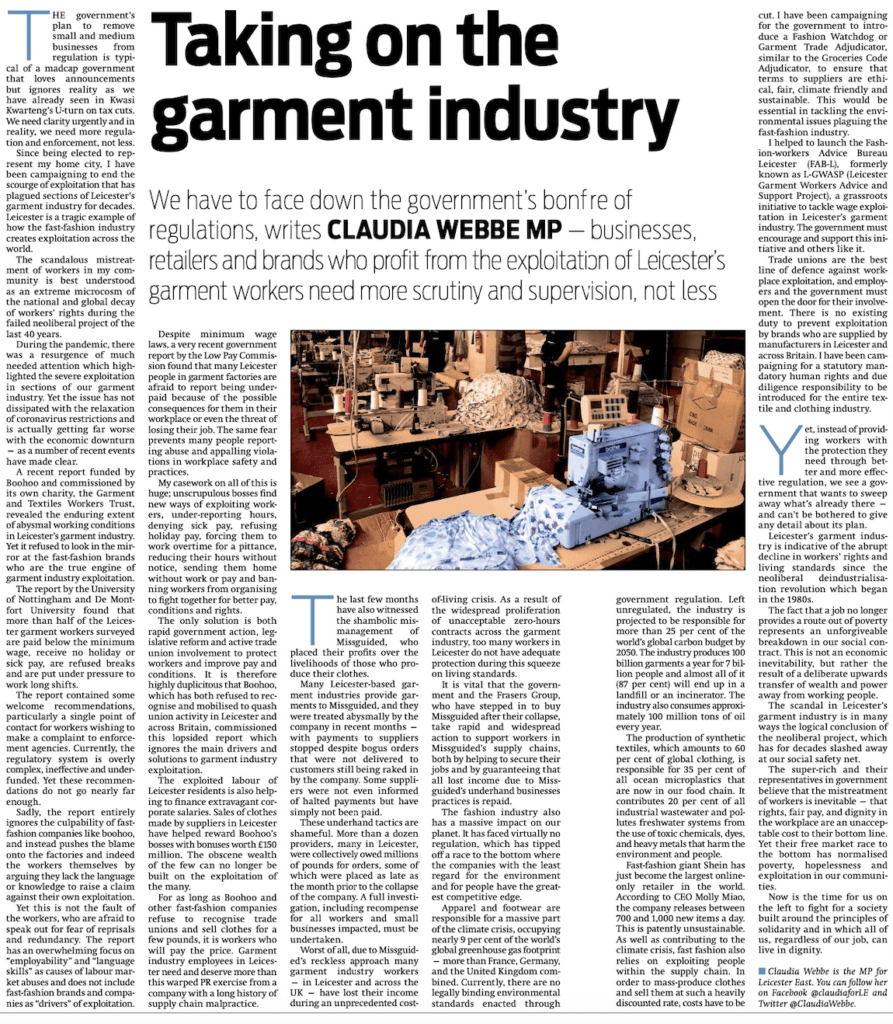
Taking on the garment industry
By Claudia Webbe MP
We have to face down the government’s bonfire of regulations, writes CLAUDIA WEBBE MP — businesses, retailers and brands who profit from the exploitation of Leicester’s garment workers need more scrutiny and supervision, not less
The government’s plan to remove small and medium businesses from regulation is typical of a madcap government that loves announcements but ignores reality as we have already seen in Kwasi Kwarteng’s U-turn on tax cuts. We need clarity urgently and in reality, we need more regulation and enforcement, not less.
Since being elected to represent my home city, I have been campaigning to end the scourge of exploitation that has plagued sections of Leicester’s garment industry for decades. Leicester is a tragic example of how the fast-fashion industry creates exploitation across the world.
The scandalous mistreatment of workers in my community is best understood as an extreme microcosm of the national and global decay of workers’ rights during the failed neoliberal project of the last 40 years.
During the pandemic, there was a resurgence of much needed attention which highlighted the severe exploitation in sections of our garment industry. Yet the issue has not dissipated with the relaxation of coronavirus restrictions and is actually getting far worse with the economic downturn — as a number of recent events have made clear.
A recent report funded by Boohoo and commissioned by the Garment and Textiles Workers Trust charity revealed the enduring extent of abysmal working conditions in Leicester’s garment industry. Yet it refused to look in the mirror at the fast-fashion brands who are the true engine of garment industry exploitation.
The report by the University of Nottingham and De Montfort University found that more than half of the Leicester garment workers surveyed are paid below the minimum wage, receive no holiday or sick pay, are refused breaks and are put under pressure to work long shifts.
The report contained some welcome recommendations, particularly a single point of contact for workers wishing to make a complaint to enforcement agencies. Currently, the regulatory system is overly complex, ineffective and underfunded. Yet these recommendations do not go nearly far enough.
Sadly, the report entirely ignores the culpability of fast-fashion companies like boohoo, and instead pushes the blame onto the factories and indeed the workers themselves by arguing they lack the language or knowledge to raise a claim against their own exploitation.
Yet this is not the fault of the workers, who are afraid to speak out for fear of reprisals and redundancy. The report has an overwhelming focus on “employability” and “language skills” as causes of labour market abuses and does not include fast-fashion brands and companies as “drivers” of exploitation.
Despite minimum wage laws, a very recent government report by the Low Pay Commission found that many Leicester people in garment factories are afraid to report being underpaid because of the possible consequences for them in their workplace or even the threat of losing their job. The same fear prevents many people reporting abuse and appalling violations in workplace safety and practices.
My casework on all of this is huge; unscrupulous bosses find new ways of exploiting workers, under-reporting hours, denying sick pay, refusing holiday pay, forcing them to work overtime for a pittance, reducing their hours without notice, sending them home without work or pay and banning workers from organising to fight together for better pay, conditions and rights.
The only solution is both rapid government action, legislative reform and active trade union involvement to protect workers and improve pay and conditions. It is therefore highly duplicitous that Boohoo, which has both refused to recognise and mobilised to quash union activity in Leicester and across Britain, commissioned this lopsided report which ignores the main drivers and solutions to garment industry exploitation.
The exploited labour of Leicester residents is also helping to finance extravagant corporate salaries. Sales of clothes made by suppliers in Leicester have helped reward Boohoo’s bosses with bonuses worth £150 million. The obscene wealth of the few can no longer be built on the exploitation of the many.
For as long as Boohoo and other fast-fashion companies refuse to recognise trade unions and sell clothes for a few pounds, it is workers who will pay the price. Garment industry employees in Leicester need and deserve more than this warped PR exercise from a company with a long history of supply chain malpractice.
The last few months have also witnessed the shambolic mismanagement of Missguided, who placed their profits over the livelihoods of those who produce their clothes.
Many Leicester-based garment industries provide garments to Missguided, and they were treated abysmally by the company in recent months — with payments to suppliers stopped despite bogus orders that were not delivered to customers still being raked in by the company. Some suppliers were not even informed of halted payments but have simply not been paid.
These underhand tactics are shameful. More than a dozen providers, many in Leicester, were collectively owed millions of pounds for orders, some of which were placed as late as the month prior to the collapse of the company. A full investigation, including recompense for all workers and small businesses impacted, must be undertaken.
Worst of all, due to Missguided’s reckless approach many garment industry workers — in Leicester and across the UK — have lost their income during an unprecedented cost-of-living crisis.
As a result of the widespread proliferation of unacceptable zero-hours contracts across the garment industry, too many workers in Leicester do not have adequate protection during this squeeze on living standards.
It is vital that the government and the Frasers Group, who have stepped in to buy Missguided after their collapse, take rapid and widespread action to support workers in Missguided’s supply chains, both by helping to secure their jobs and by guaranteeing that all lost income due to Missguided’s underhand businesses practices is repaid.
The fashion industry also has a massive impact on our planet. It has faced virtually no regulation, which has tipped off a race to the bottom where the companies with the least regard for the environment and for people have the greatest competitive edge.
Apparel and footwear are responsible for a massive part of the climate crisis, occupying nearly 9 per cent of the world’s global greenhouse gas footprint — more than France, Germany, and the United Kingdom combined. Currently, there are no legally binding environmental standards enacted through government regulation.
Left unregulated, the industry is projected to be responsible for more than 25 per cent of the world’s global carbon budget by 2050. The industry produces 100 billion garments a year for 7 billion people and almost all of it (87 per cent) will end up in a landfill or an incinerator. The industry also consumes approximately 100 million tons of oil every year.
The production of synthetic textiles, which amounts to 60 per cent of global clothing, is responsible for 35 per cent of all ocean microplastics that are now in our food chain. It contributes 20 per cent of all industrial wastewater and pollutes freshwater systems from the use of toxic chemicals, dyes, and heavy metals that harm the environment and people.
Fast-fashion giant Shein has just become the largest online-only retailer in the world. According to CEO Molly Miao, the company releases between 700 and 1,000 new items a day. This is patently unsustainable. As well as contributing to the climate crisis, fast fashion also relies on exploiting people within the supply chain. In order to mass-produce clothes and sell them at such a heavily discounted rate, costs have to be cut.
I have been campaigning for the government to introduce a Fashion Watchdog or Garment Trade Adjudicator, similar to the Groceries Code Adjudicator, to ensure that terms to suppliers are ethical, fair, climate friendly and sustainable. This would be essential in tackling the environmental issues plaguing the fast-fashion industry.
I helped to launch the Fashion-workers Advice Bureau Leicester (FAB-L), formerly known as L-GWASP (Leicester Garment Workers Advice and Support Project), a grassroots initiative to tackle wage exploitation in Leicester’s garment industry. The government must encourage and support this initiative and others like it.
Trade unions are the best line of defence against workplace exploitation, and employers and the government must open the door for their involvement. There is no existing duty to prevent exploitation by brands who are supplied by manufacturers in Leicester and across Britain. I have been campaigning for a statutory mandatory human rights and due diligence responsibility to be introduced for the entire textile and clothing industry.
Yet, instead of providing workers with the protection they need through better and more effective regulation, we see a government that wants to sweep away what’s already there — and can’t be bothered to give any detail about its plan.
Leicester’s garment industry is indicative of the abrupt decline in workers’ rights and living standards since the neoliberal deindustrialisation revolution which began in the 1980s.
The fact that a job no longer provides a route out of poverty represents an unforgiveable breakdown in our social contract. This is not an economic inevitability, but rather the result of a deliberate upwards transfer of wealth and power away from working people.
The scandal in Leicester’s garment industry is in many ways the logical conclusion of the neoliberal project, which has for decades slashed away at our social safety net.
The super-rich and their representatives in government believe that the mistreatment of workers is inevitable — that rights, fair pay, and dignity in the workplace are an unacceptable cost to their bottom line. Yet their free market race to the bottom has normalised poverty, hopelessness and exploitation in our communities.
Now is the time for us on the left to fight for a society built around the principles of solidarity and in which all of us, regardless of our job, can live in dignity.
Claudia Webbe MP is the member of Parliament for Leicester East. You can follow her at www.facebook.com/claudiaforLE and twitter.com/ClaudiaWebbe


